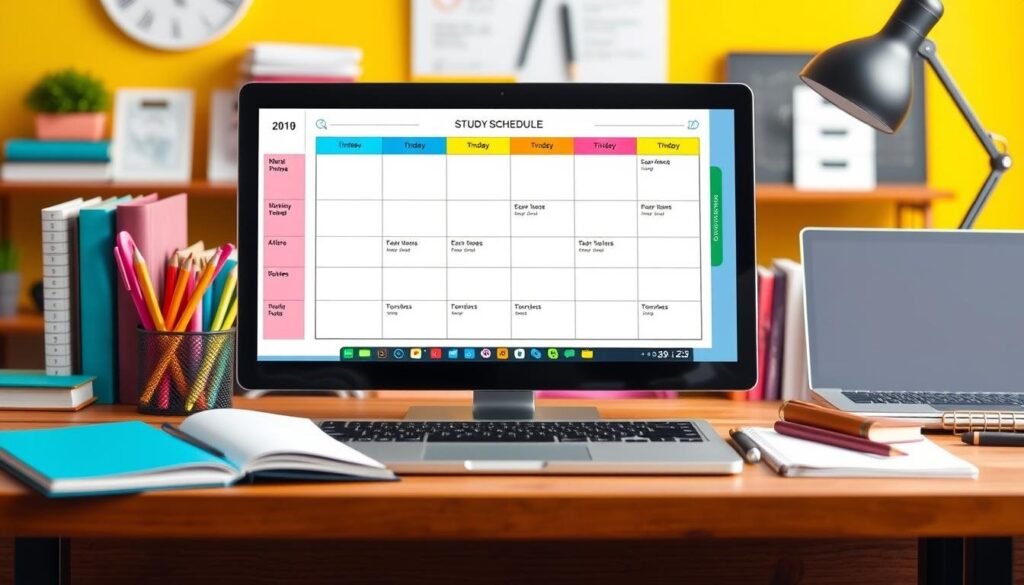In today’s competitive world, students need to study smarter, not harder. This article will give you the best study tips and tools to reach your full potential. By using proven strategies, you can make learning more effective.
As we explore this guide, you’ll learn how to improve your study habits. You’ll find ways to boost your productivity and get better grades.
Key Takeaways
- Understanding the significance of effective study techniques can transform academic performance.
- Developing a personalized study schedule can enhance focus and organization.
- Utilizing active recall and spaced repetition boosts long-term retention of information.
- Incorporating productivity tools can streamline the study process.
- Cultivating a motivating study environment is crucial for success.
- Group studying can provide diverse perspectives and deeper understanding.
- Effective stress management techniques are essential for maintaining student well-being.
Understanding the Importance of Effective Study Techniques
Effective study techniques are key to doing well in school. Students often struggle to understand and remember what they learn. Using the right study methods can really help their grades.
Using different study techniques helps students learn in many ways. This makes it easier to understand hard topics. For example, pictures, group talks, and hands-on projects make learning fun and useful.
Knowing how study methods help students succeed is important. By using organized study plans, students can do better in school. This way, they can manage their studies better and feel more accomplished.

Crafting a Study Schedule that Works for You
Creating a good study schedule is key to doing well in school. A well-planned study schedule helps you manage your time better and be more productive. Time blocking and prioritizing are two important parts of making a study schedule.
These methods help you focus on different subjects or tasks. They keep you organized and on track.
Time Blocking: A Strategy for Enhanced Focus
Time blocking is a great way to stay focused while studying. It involves dividing your day into blocks for specific tasks. This helps you avoid distractions and concentrate better.
It also helps you organize your study time well. For example, you might spend two hours on math, then take a break. After that, you can move on to history.

Prioritizing Study Sessions: What to Tackle First
Prioritizing your study sessions is crucial for being productive. You should figure out which subjects are most urgent or challenging. This way, you can plan your study time effectively.
Here are some tips for prioritizing your study sessions:
- Identify upcoming exams and assignments.
- List subjects based on difficulty and personal confidence level.
- Set short-term goals to complete certain topics before moving on.
Using a study schedule with time blocking and prioritization can really help you do better in school. By focusing on each subject and tackling the toughest topics first, you can study more efficiently.
| Time Block | Subject | Focus Level |
|---|---|---|
| 9:00 AM – 11:00 AM | Mathematics | High |
| 11:00 AM – 12:00 PM | History | Medium |
| 1:00 PM – 2:30 PM | Biology | High |
| 2:30 PM – 3:00 PM | Break | Low |
| 3:00 PM – 4:30 PM | Literature | Medium |
Using Study Tips to Enhance Learning Retention
Using good study tips can really help you remember things better. Two key methods are active recall and spaced repetition. These help you understand and remember stuff for a long time, which is great for learning anything.
Active Recall: The Power of Testing Yourself
Active recall means pulling information from your memory. It makes your brain connections stronger and helps you remember better. Instead of just reading or highlighting, try to really get involved with what you’re learning. Here are some ways to do that:
- Quizzing yourself with flashcards
- Explaining concepts aloud as if teaching someone else
- Practicing with sample questions or past tests
Spaced Repetition: Why It Matters for Long-term Retention
Spaced repetition involves reviewing material at longer and longer intervals. It’s better than cramming. It helps in many ways:
- Enhancing memory consolidation
- Reducing forgetting curves and extending retention spans
- Promoting efficient use of study time
Combining active recall with spaced repetition makes studying more effective. It helps you remember things better over time.

Incorporating Productivity Tools into Your Study Routine
Students can boost their study efficiency with productivity tools. These tools help make every study session count. They ensure tasks are done on time and knowledge is organized. Time management apps and notetaking software are key.
Apps for Time Management: Make Every Minute Count
Time management apps are vital for students aiming to optimize their study schedules. They track tasks and deadlines, preventing cramming and promoting a steady study routine. Here are some top picks:
- Trello: An intuitive platform that helps organize tasks visually through boards and cards.
- Notion: A versatile tool for note-taking, planning, and database management, all in one place.
- Todoist: A straightforward task manager that assists students in prioritizing and completing assignments efficiently.
Using Notetaking Software for Better Organization
Notetaking software is key for organizing study materials and keeping them accessible. It aids in reinforcing learning and ensures important information is easy to find. Here are some top options:
- Evernote: A popular choice for capturing notes, images, and web articles, all stored in one easy-to-navigate space.
- Microsoft OneNote: Offers a flexible canvas for organizing notes by subjects or projects, complete with tagging features.
- Google Keep: Great for quick notes and reminders, allowing students to sync across devices seamlessly.
Exam Preparation Hacks to Maximize Last-Minute Study
Students often face tight deadlines before exams. To make the most of limited time, using effective study hacks is key. Targeted review and mini-quizzes can boost retention and clear up doubts just before the exam.
Effective Review Techniques for Crunched Time
When time is short, strategic review is crucial. Here are some useful tips:
- Prioritize Key Concepts: Focus on the most important topics and details.
- Use Flashcards: Make flashcards for quick review of key definitions and concepts.
- Summarize Information: Write short summaries for major topics to help remember them.
- Set Timed Sessions: Use short, focused periods for each subject to stay focused.
Creating Mini-Quizzes to Assess Knowledge
Mini-quizzes help you check your readiness for exams. They also help solidify what you’ve learned:
- Question Variety: Mix up question types like multiple-choice, true/false, and short answers.
- Time Constraints: Set a timer to mimic the real exam feel, improving your ability to recall under pressure.
- Review Incorrect Answers: Look at your mistakes to find areas you need to work on and fix them right away.
Using these study hacks helps students make the most of their time before exams. By combining smart review methods with mini-quizzes, they can boost their confidence and retain more information.
Focus Strategies for Distraction-Free Study Sessions
To study well, you need good focus strategies. A quiet study area is key to better concentration and learning. Things like lighting, noise, and organization help a lot.
The Role of Study Environment: Setting the Scene
A tidy study space helps you focus better. Good conditions for focus include:
- Bright but non-glaring lighting to reduce eye strain
- Minimal background noise to prevent distractions
- An uncluttered desk to promote clarity and focus
Creating a quiet study area boosts your productivity and learning.
Mindfulness and Meditation: Techniques to Enhance Concentration
Mindfulness can also improve your focus. Meditation helps you stay calm and focused. It’s shown to help you remember things better. Key mindfulness practices are:
- Breathing exercises to center the mind
- Short meditation sessions before studying to clear distractions
- Mindful listening to heighten awareness of surroundings
Using these mindfulness techniques can make you more focused. A good study space and mindful practices together make studying better.
Staying Motivated: Finding Your Study Drive
Keeping up study motivation can be tough for many students. Setting clear, structured goals is key. SMART goals help reach milestones more effectively.
Setting SMART Goals: Achieving Milestones Effectively
The SMART goals framework helps students set clear goals and track progress. Each part—Specific, Measurable, Achievable, Relevant, and Time-bound—makes goals realistic and reachable. For instance:
| SMART Criteria | Example Goal |
|---|---|
| Specific | Improve math skills |
| Measurable | Complete five practice tests |
| Achievable | Study for one hour each day |
| Relevant | Focus on algebra concepts |
| Time-bound | Achieve this within one month |
Using this method boosts study motivation by showing progress.
Positive Reinforcement: Rewarding Yourself for Achievements
Positive reinforcement greatly boosts student motivation. Rewarding oneself for study milestones makes learning fun. This can happen in many ways:
- Taking a short break after completing a study session.
- Enjoying a favorite snack or treat for achieving a specific target.
- Engaging in a fun activity after finishing an assignment.
Such practices make studying more enjoyable and reinforce dedication to academic goals. Combining SMART goals with positive reinforcement leads to a rewarding study routine, improving academic performance.
Study Groups: Collaborating for Success
Study groups are a fun and effective way to learn together. Students share knowledge and get different views that solo studying can’t offer. This method helps understand material better and keeps everyone motivated.
The Benefits of Group Studying: Shared Knowledge
Being part of a study group can really improve your learning. Here are some key benefits:
- Enhanced Understanding: Talking through concepts with others helps solidify your own knowledge.
- Multiple Perspectives: Everyone’s unique insights add up to a deeper understanding of the subject.
- Increased Motivation: The social aspect of study groups helps keep study habits consistent.
- Supportive Environment: Sharing problems and solutions with friends can make studying less stressful.
How to Stay on Track in a Group Setting
Study groups offer many benefits, but staying focused is key. Here are some tips to keep group sessions productive:
- Set Clear Goals: Start each session by setting specific topics and objectives.
- Establish Ground Rules: Talk about what’s expected in terms of participation, respect, and time management.
- Rotate Roles: Give everyone different tasks to keep everyone involved, like note-taking or presenting.
- Use Visual Aids: Use charts, flashcards, or diagrams to help understand and stay interested.
Using these strategies can make study groups more effective. This collaborative learning not only deepens understanding but also builds lasting academic skills.
| Benefits of Study Groups | Impact on Learning |
|---|---|
| Enhanced Understanding | Helps clarify difficult topics through discussion. |
| Multiple Perspectives | Offers varied interpretations leading to deeper insights. |
| Increased Motivation | Encourages regular study habits and accountability. |
| Supportive Environment | Reduces stress through shared experiences and camaraderie. |
Utilizing Visual Aids for Enhanced Learning
Visual aids are key in education, making learning easier and more fun. They help students understand and remember complex ideas better. Tools like mind maps, diagrams, and charts make learning more engaging and effective.
Creating Mind Maps: Visualizing Concepts Effectively
Mind maps are great for organizing thoughts and showing how ideas are connected. They help students get the main points of a subject. By turning written info into pictures, mind maps make learning fun and interactive.
Benefits of Diagrams and Charts in Study Materials
Diagrams and charts make information easy to see and remember. They break down hard topics into simple parts. Studies show that using diagrams helps students understand and recall info better.
By using visual aids, learners can turn hard ideas into clear pictures. This makes learning easier and more enjoyable.
Stress Management Techniques for Students
Students often face a lot of pressure, leading to stress. This stress can hurt their academic success. It’s important to know how to manage stress to keep your mind healthy and stay productive.
Knowing the signs of burnout is key. It helps you act before things get too bad. Adding relaxation practices to your daily life can really help reduce stress and boost your well-being.
Recognizing Signs of Burnout: A Student’s Guide
Burnout shows up in different ways. Here are some common signs:
- Chronic fatigue: Feeling tired even after getting enough sleep.
- Decreased performance: Struggling to focus or finish tasks.
- Emotional detachment: Feeling no interest or care about studying.
- Increased irritability: Getting easily frustrated or feeling overwhelmed.
Spotting these signs early can help you manage stress better. It can stop burnout from getting worse.
Relaxation Practices: Breathing Techniques and More
Relaxation practices can really help lower stress levels. Here are some good ones:
- Deep breathing: Breathe in deeply through your nose, hold it for a bit, then breathe out slowly through your mouth.
- Progressive muscle relaxation: Tighten and then relax different muscle groups to lessen physical tension.
- Mindfulness meditation: Stay in the present moment and accept your thoughts without judgment.
- Guided imagery: Imagine peaceful scenes to calm your anxiety.
Adding these relaxation practices to your daily routine can help manage stress and fight burnout.
Conclusion
In today’s competitive academic world, finding effective study techniques is key. Strategies like time blocking, active recall, and using productivity tools can greatly help. These methods are not just about studying more. They help you study smarter and retain information better.
This article showed how a good study schedule, mindfulness, and study groups are vital. They help you stay focused, understand material better, and get good grades. These are all important for success in school.
Students should think about adding these tips to their daily study routine. By doing so, they can reach their full academic potential. It’s time to learn the best ways to study and start this journey with confidence.
FAQ
What are some effective study tips to boost my learning?
Effective study tips include active recall and spaced repetition. These methods help solidify information in your memory. Creating a study schedule is also key to staying organized.
Using productivity tools like task management apps can keep you on track. These tools help you manage your time and tasks efficiently.
How do productivity tools improve studying?
Productivity tools like time management apps help organize tasks and set deadlines. They also track your progress. This makes studying more efficient and helps you stay focused.
Notetaking software keeps your notes structured and easy to access. This makes reviewing and studying simpler, helping you retain information better.
Can you suggest some exam preparation hacks?
Yes, effective exam preparation includes using review techniques for short time frames. Creating mini-quizzes also helps assess your knowledge. Practicing time management during review sessions boosts your study efficiency.
What focus strategies can help during study sessions?
To focus better, create a distraction-free study environment. Consider the lighting and noise levels. Mindfulness and meditation can also improve your concentration and study outcomes.
How can I stay motivated while studying?
Set SMART goals to stay motivated. These goals provide clear milestones to work towards. Rewarding yourself for completing tasks also fosters a supportive study routine.
What are the benefits of study groups?
Study groups offer collaboration and shared knowledge. They provide diverse perspectives and insights. This helps maintain motivation and accountability, making study sessions more productive.
How do visual aids help in studying?
Visual aids like mind maps and diagrams simplify complex information. They are especially helpful for visual learners. These aids enhance learning retention by presenting information in an engaging way.
What stress management techniques can students use?
Students can manage stress by recognizing burnout signs and using relaxation techniques. Breathing techniques and mindfulness exercises can reduce stress. These practices promote well-being during challenging study periods.
